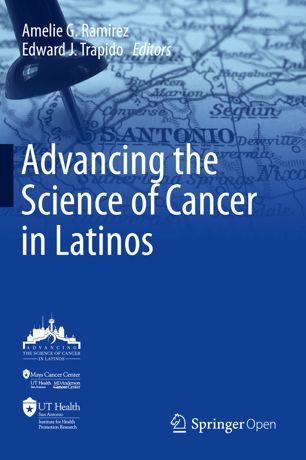
Share On Social!
As U.S. Latinos face a staggering 142% projected rise in cancer cases by 2030, UT Health San Antonio leaders gathered international cancer experts to publish a new book with innovative research and recommendations to reduce Latino cancer.
The book, Advancing the Science of Cancer in Latinos in Springer Open Books, showcases results of the same-named conference that brought 300 researchers to San Antonio in 2018.
A follow-up conference, set for Feb. 26-28, 2020, in San Antonio, is open for registration.
 Included in the new book are promising research findings on Latino cancer and strategies for new research covering the entire cancer continuum, from advances in risk assessment, prevention, screening, detection, diagnosis, treatment, survivorship, and policy.
Included in the new book are promising research findings on Latino cancer and strategies for new research covering the entire cancer continuum, from advances in risk assessment, prevention, screening, detection, diagnosis, treatment, survivorship, and policy.
“Our book, Advancing the Science of Cancer in Latinos, takes an unprecedented look at Latino cancer from many disciplines to encourage the kind of collaboration among diverse professionals we need to move the field forward,” said Dr. Amelie Ramirez, co-editor of the book. She is professor and chair of Population Health Sciences and director of the Institute for Health Promotion Research (IHPR) at UT Health San Antonio. The IHPR co-hosted the 2018 conference along with the university’s Mays Cancer Center, home to UT Health San Antonio MD Anderson Cancer Center.
“We believe the recommendations here can spark dialog and collaboration for new solutions to eliminate cancer health disparities among Latino populations.”
The book, and the conference, are a call to action to address Latino cancer health disparities.
Cancer is the Leading Cause of Latino Death
Latinos face a higher risk for certain cancers, such as liver cancer, compared to whites.
This stems from cultural barriers to care, low screening rates, underrepresentation in clinical studies, and data that fails to reflect the diversity within the U.S. Latino population.
 The book authors urge researchers, population health clinicians, communities and policymakers to see the Latino population as made up of many subgroups. For example, a family’s country of origin can affect genetics, environment, culture, food preferences and lifestyle.
The book authors urge researchers, population health clinicians, communities and policymakers to see the Latino population as made up of many subgroups. For example, a family’s country of origin can affect genetics, environment, culture, food preferences and lifestyle.
The book suggests that researchers create studies based on subgroups to provide more meaningful results, as health care moves toward a customized approach in precision medicine.
“This research approach is important because Latinos are projected to be one of every three people in the U.S. by 2050,” Dr. Ramirez said.
Recommendations to Reduce Latino Cancer
The book also unpacks recommendations for action in these areas:
Genetics, environment, lifestyle, and Latino cancer
- Cancer prevention strategies should address changing U.S. demographics.
- Disaggregate Latino cancer data into subgroups.
- Improve data collection on Latino national origin so that cancer registries can account for Latino heterogeneity in their analyses.
 Biology of cancer health disparities
Biology of cancer health disparities
- Find biomarkers associated with gastric pre-malignant lesions in Latinos.
- Conduct comprehensive tumor genomic studies of gastric cancer in Latinos.
- Elucidate biological factors that promote outcome disparities among Latinas with breast cancer.
- Investigate the role of ethnicity in breast cancer susceptibility.
Latino cancer risk, prevention, and screening
- Consider heterogeneity among Latinas when estimating breast cancer risk and mortality.
- Support international collaborations to access population data and biorepositories in Latin America.
- Conduct more epidemiological studies on prostate cancer using adequate risk factor data that includes Latinos.
- Consider ethnic and cultural background in the design of research and interventions to improve diet among Latino groups.
Advances in cancer therapy and clinical trials
- Structure diverse ethnic patient participation in biomarker trials.
- Include biomarker-negative patients in clinical trials.
- Improve Latino recruitment into cancer clinical trials.
- Use comorbidities as exclusion criteria only for sound evidence-based reasons.
- Attract more Latinos into the pipeline for higher education in the health professions and medical school.
 Latino cancer in the era of precision medicine
Latino cancer in the era of precision medicine
- Include more Latinos in precision medicine research.
- Consider ethnicity and genetic ancestry when making cancer treatment choices based on gene expression profiles.
- Ensure Latinos have access to tumor molecular analysis for targeted cancer therapy.
Cancer outcomes and survivorship in Latinos
- Provide access to cancer survivorship care that is linguistically and culturally appropriate for Spanish-speaking Latinos.
- Engage Latino communities in design and implementation of behavioral interventions that can be delivered in community settings and are linked to cancer care systems.
Recommendations to Engage Latinos, Policymakers
The book also features recommendations for action in these areas:
Engaging Latinos in cancer research
- Engage Latinos in cancer prevention and control research, such as interventions that use community-based participatory research principles
- Deliver personalized interventions through texting and mobile media services.
- Design cervical cancer interventions that target cultural factors which may operate at various levels of influence.
- Use a community-based approach to increase participation of Latinos in biobanking and biospecimen research.
 Emerging policies in U.S. healthcare
Emerging policies in U.S. healthcare
- Researchers who study cancer in Latinos should advocate to Congress for their own work and educate policy makers of its value in helping people and saving lives.
- Protect the Affordable Care Act.
- Address the health effects of environmental quality on cancer and other illnesses.
- Empower non-Latino physician partners with cultural competence to enhance their relationship with Latino patients and their caregivers.
- Foster survivor advocacy within the community.
- Leverage online channels.
- Protect patients through local policy by physicians, healthcare systems, and insurance companies.
How to Use These Latino Cancer Findings
Ramirez said the Advancing the Science of Cancer in Latinos book sets an agenda for future initiatives to address Latino cancer health disparities on all levels.

“We hope that readers will explore this important research to gain a fresh, comprehensive perspective on Latino cancer health disparities,” Ramirez said. “We anticipate this will inspire critical thinking and strategizing about how people can apply some of this research and practice into their own work at their own institution, leading to more collaboration, more research and success in improving the health and lives of U.S. Latinos.”
Advancing the Science of Cancer in Latinos was supported in part by the Mays Cancer Center and IHPR at UT Health San Antonio, and the National Institute on Minority Health and Health Disparities (R13MD012457-01).
Along with Ramirez, the book’s other co-editor is Dr. Ed Trapido, an epidemiology researcher at LSU School of Public Health and LSU Health Sciences Center.
Other UT Health San Antonio researchers contributed to the book: Dr. Ruben A. Mesa, director of the UT Health San Antonio MD Anderson Cancer Center; the research team from the Institute for Health Promotion Research (IHPR), including Dr. Patricia Chalela, Dr. Pramod Sukumaran, Cliff Despres, Andrea Fernandez, and Edgar Muñoz; and Sneha Prabhu, formerly of the IHPR.
Read the book and find the latest in Latino cancer and healthcare issues!
Explore More:
AccessBy The Numbers
142
Percent
Expected rise in Latino cancer cases in coming years



